Statewide K–12 CS Education Summit Seeks to Jump Start Computer Science Education in Illinois
Computers are here to stay—an integral part of our society. If the state of Illinois is going to keep up with the rest of the world, the next generation needs to learn not just how to use them, but how to program them.
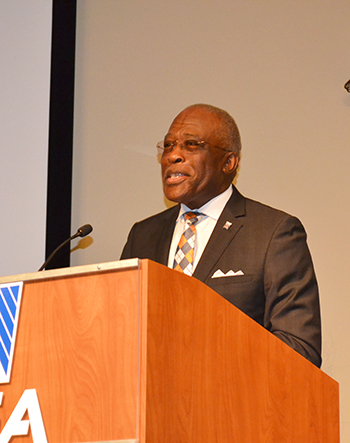
Chancellor Robert Jones makes opening remarks at the summit.
October 16, 2019
Folks from around the state who are passionate about computer science (CS) education and adhere to the above philosophy gathered at NCSA (the National Center for Supercomputing Applications) on September 20th for the first Illinois Statewide K–12 CS Education Summit. The goal of the many participants was to become better informed about how to begin a CS program, to network with like-minded stakeholders, and to draft a state plan for CS education.
The summit included a star-studded cast: Deputy Governor Jesse Ruiz; the President of the University of Illinois, Timothy Killeen; the Chuancellor of the University of Illinois at Urbana-Champaign, Robert Jones; NCSA’s Director and Chief Scientist, Bill Gropp; and James D Anderson, the Dean of the College of Education. Also sharing remarks during the opening were two people who were the driving force behind the summit: Steve Svetlik, the President and Founder of CS4IL and Gabrielle Allen, the College of Education’s Associate Dean for Research.
In his introductory remarks, Chancellor Robert Jones eloquently shared both the state’s need for CS education, as well as the goals of the summit: “Students without the skills will find far too many doors closed to them with an increasing frequency, and the impact of those lost opportunities will have rippling effects across their careers. So as a state, we really do have a chance, and I would go so far as to say we have a strategic opportunity, to develop a comprehensive and sustainable plan for K through 12 computer education that will ensure a very equitable and accessible experience for every student and every school.”
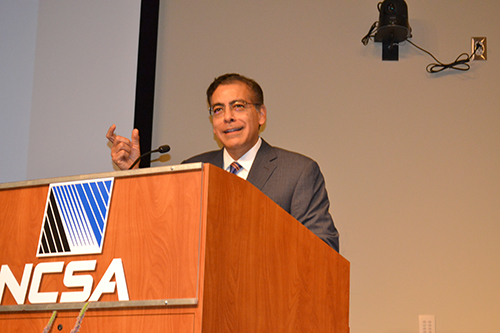
Illinois Deputy Governor Jesse Ruiz
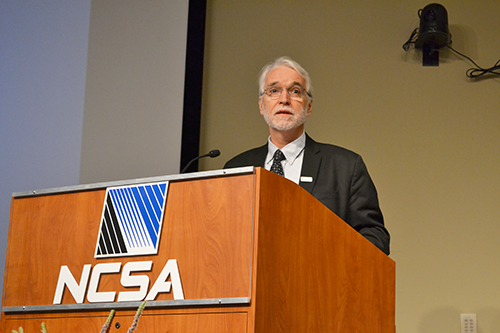 Timothy Killeen, President of the University of Illinois
Timothy Killeen, President of the University of IllinoisEchoing Jones’ description of the need for CS education was Illinois Deputy Governor Jesse Ruiz. “Computer science is a skill set that all our children will need to flourish in the 21st century economy,” he shared. “These skills will enable our students to launch in successful careers, not only in the tech industry, but just about any other career in the 21st century global economy that requires this skillset. I can't think of one that really doesn't.”
According to Ruiz, CS education is necessary to help populate a thriving STEM pipeline. “We need to make sure that computer science education is offered in all our public schools, driving the pipelines of school, to college, to careers.”
Regarding populating the STEM pipeline, President Timothy Killeen told of a Chicago student, Jason Caracas, who had math skills but whose high school had no computer science program, “no computer science teacher to provide that gentle push in the right direction and help ignite the spark that simmered inside Jason and so many of the young people. Jason fortunately found that nudge working with his father and his brother researching the subject on his own, on his private time.” Caracas ended up in CS at Illinois, is thriving, and is on track to graduate in 2021.
“And he has a fantastic success story,” Killeen continued. “Let's multiply that. Let's duplicate that. Let's build that up into a pipeline that can really contribute importantly, because we can't count on everything coming into place for individuals and people finding their calling on their own without supporting infrastructure. They do need that motivated, knowledgeable computer science teacher to turn their spark into something great, and we're ready at our level in public higher education to take care of the rest.”
The keynote speaker of the Summit was Brenda Darden Wilkerson, the President and CEO of AnitaB.org and founder of the original Computer Science for All program in Chicago. Wilkerson shared about her journey, challenges she faced when founding the original CS4All program in Chicago, challenges audience members will most likely face, plus key advice on how to overcome those.
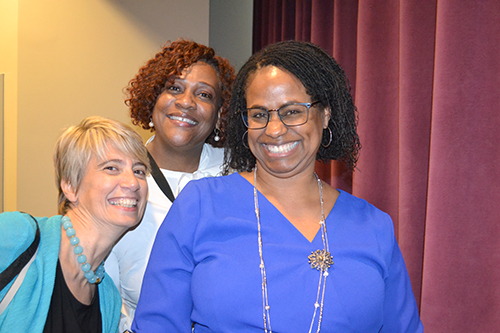
Brenda Darden Wilkerson (right) with two friends who participated in the Summit.
Acknowledging that advocating for CS education is difficult, Wilkerson called it “hard work.” She also acknowledged how most summit participants were probably feeling:
“It feels really good to be in the room with other people that believe like you do, but many of us will go back to those places where people are still, ‘What are you talking about?’ or ‘We don't have money for that,’ or ‘Wait,' or whatever the excuses.” Her advice for these folks was, “So I want you to remember when you go back and you start to hear that, that it's all about equity and access.”
Wilkerson summed up major challenges facing the group in three tasks: “Number one, we have to change mindsets. Number two, we have to change systems. And number three, we have to stamp out fear.”
Regarding changing mindsets, one Herculean challenge the group faces is getting CS added to the list of common cores.
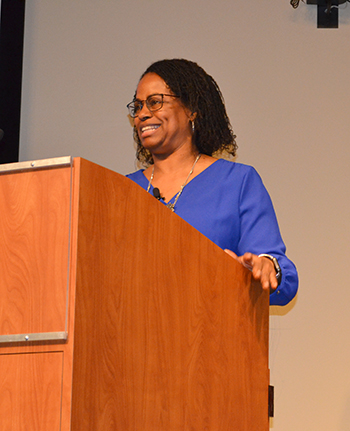
Brenda Darden Wilkerson, the President and CEO of AnitaB.org.
“What are the common cores?” she asked…“Did you know those are all almost 200 years old? Think about how much our society has changed in the last hundred years, yet our classrooms pretty much look the same as they did 200 years ago.”
Regarding the pushback encountered in Chicago when they suggested making CS a separate requirement, she recalled, “So we said, ‘Let's make this a separate requirement, a CS requirement.’ And you know what happened, right? Everybody stood up and said, ‘That will never happen!’ Have you heard any of those words? Okay, but you're here, so obviously you're ignoring them.”
Wilkerson said another mindset that needs to be changed is the idea that because adults can’t get technology, children can’t. (How many of us adults will truthfully confess that, when struggling to figure out a certain technology, we’ve gone to our children for help?)
“People still ask me what CS is,” said Wilkerson, after which, they go on to add, “By the way, I don't really understand what that is, so they [our children] certainly can't.’”
“Just because we can’t understand something does not mean our children can't get it,” Wilkerson insisted. “In fact, I haven't met a child who hasn't been excited about CS.”
So her advice regarding those who think children can’t do CS was this: “It's crazy. Take them to the classrooms where it's happening. Take them and let them see real children again. I think if we distance ourselves from the very people we serve, we start to imagine what they think and need, and we no longer know what they think and need.”
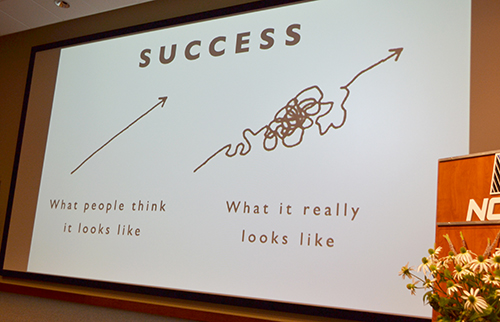
Wilkerson slide depicting the circuitous route CS Education proponents may have to travel to achieve their goal.
Other faulty mindsets she’s encountered are these: 'Girls aren’t any good at STEM,' plus another closely related one: 'Gender parity in technology is going to take 202 years.' To these naysayers, and those who caution, “Wait” she insisted: “It's about urgency. It's about making it happen for our children today!”
To educators, she added, “You get one shot at a kindergartener; they’re no longer a kindergartener next year. You get one shot at that critical fifth grade year to ensure that the impact is made on that student. So you need to understand, there's an expiration date on those children, and on our ability to sit back and think about this too long.”
Wilkerson issued a final insight, that humans tend to avoid conflict, and one final piece of advice. “That's not how this is going to work,” she admitted. “It's messy. It's irritating. It's painful. Sometimes you might be alone. But if you keep that goal out in front of you as you know that it's right to do, you will get it done. If we can do it in Chicago, anybody can do it!”
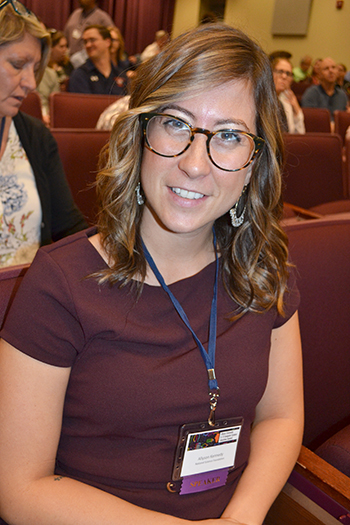
Allyson Kennedy, NSF Assistant Program Director.
The summit also included panels about best practices, curricula, the workforce, supporting research on CS education, how to implement CS in schools, and fostering diversity and inclusion. One panelist on hand to share about National Science Foundation (NSF) initiatives was Allyson Kennedy, an Assistant Program Director in the Education and Workforce Development Division housed in the Computer Science Directorate. Kennedy’s goal in attending the summit was to share about funding opportunities NSF currently offers for teachers and researchers to get involved in to help scale their computer science education efforts across the state. For example, NSF supports CS curriculum for teachers and the Research Practitioner Partnership Program for researchers.
Besides presentations and panels, specific time slots were set aside to actually draft a state plan for CS education. Plus, during the breakfast, lunch, and breaks, the work of the Advanced Visualization Lab was showcased in NCSA’s AVL lab, where the group aired a number of its scientific visualization demos.
Summit participants hoped to gain information about CS programs and to network with like-minded individuals. For instance, one Chicago family who attended the summit was Kenneth and Valerie Jones and their son, Kenneth, Jr. Valerie, a Computer Science Engineer and manager of computer science engineers for Capital One, along with her husband, Kenneth, an educator, have begun a not-for-profit called Sundiata which teaches underprivileged students about technology—specifically how to code. In existence for about a year and a half now, Sundiata provides Saturday programs for third grade up through high school students.
The Jones’ philosophy is simple: start young, providing support to youngsters as they navigate through the STEM pipeline and out into the workforce.
“We are passionate about teaching young students about coding, and technology, and what it takes to get things and skills you need to succeed in the workforce today,” Valerie explained. Also, she advocated teaching kids as early as possible. “We believe children are sponges, and they can soak up this information much earlier than what people once used to believe. And so once you start earlier, start giving them those skills that they need to succeed, then they will be able to take those skills and go on from high school to college, then eventually out into the workforce.”
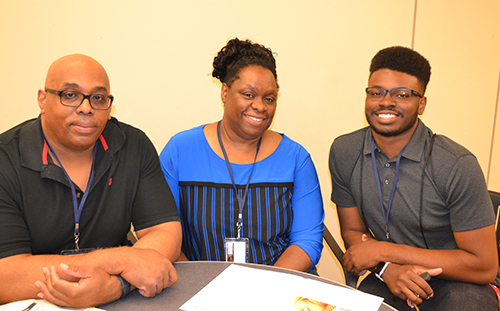
Kenneth and Valerie Jones and their son, Kenneth, Jr.
Kenneth senior is the educational expert in the organization. A doctoral student in Education Policy, Organization, & Leadership at Illinois, he came to the summit to get an overview of CS education. He asserted that Sundiata is currently a technology base covering many facets of technology.
“So I wanted to come to the summit to get an idea of what will be covered, and what is going on in the industry, what issues are being addressed, especially curriculum wise, statewide.”
Formerly a teacher in the Chicago schools system, he acknowledged, “So I saw the deficit that exists within students on lack of technology. And we also see the importance of why computer science needs to be a part of the K through 12 curriculum in every school. So our program is geared towards doing that as far as introducing under-represented minorities to the field of technology.”
He added that his family wanted to come to this summit to get an overview, so as they’re doing workshops and adding more programs, including cyber security and robotics, a couple of areas they hope to address in the future, they have a better idea of what they're doing.
Kenneth junior is in college majoring in business, and pretty much became interested in computers by osmosis. While he claimed that he had a say in the matter, “I wouldn't say forced,” he acknowledged, “It's kind of also my interest in learning computer science as well,” and admitted that he took a lot of classes in high school.
Being a young person who grew up in computer science, he shared why he came to the summit: “I'm looking forward to really understanding CS as a background. I kind of see how the world is shifting from my perspective. So it'll be cool to see from other different perspectives, how education is going, especially computer science.”
Regarding what she hoped to glean from the summit, Valerie added: “I’m very passionate about education. I'm very happy to be here. I'm interested in what we have, what we're going to learn today, and what we can use to apply to our program.”
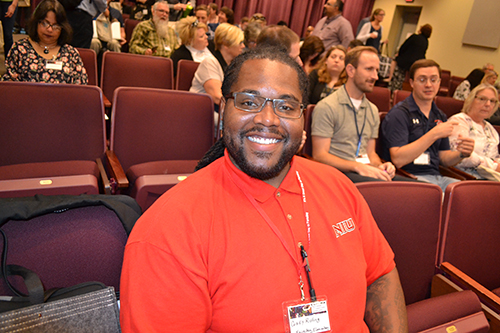
Corey Rolling, the technology coordinator at Fairdale Elementary in Chicago.
One educator hoping to gain insight regarding government policies about bringing technology into underprivileged neighborhoods was Corey Rolling, the technology coordinator at Fairdale Elementary in Chicago.
“I'm really looking to roll out a program for ourselves at Fairdale Elementary,” Rolling explained. “And this is step one—making connections.” Rolling made a key connection at the summit: he met Tori Williams, the district Integration Manager of Computer Science at CPS. “So that's one of my first connections,” Rolling explains, “and he told me to get in contact with him and that he would help us out."
Fairdale serves Pre K through 8th grade students, which Rolling believes is the perfect age to introduce kids to technology. In fact, regarding early exposure to technology, he said, “Yes, especially early because the kids, they have phones at the age of three. They know how to work phones!” So he hopes to roll out coding, putting together applications, apps, and games. For the older kids, he hopes to introduce them to cybersecurity.”
“Even now in cyber security, you don't have to have a degree for it,” he explained. “It's high demand. And also they hire kids straight out of high school to do cyber security. They’re getting paid good money. Very, very good money. So we're going to get on it. Everything is technology driven and technology based.”
Story and photographs by Elizabeth Innes, Communications Specialist, I-STEM Education Initiative.
For more I-STEM articles about computer science, see:
More: Computer Science, 2019
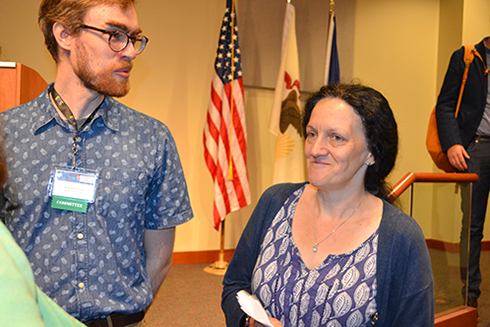
Gabrielle Allen (right), the driving force behind the summit, chats with Chicago Public School's Andy Rasmussen.
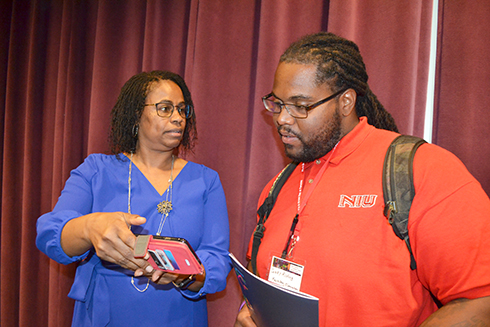
Corey Rolling (right) networks with Brenda Darden Wilkerson.













.jpg)
















